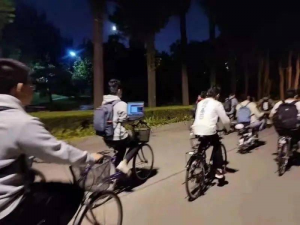“Involution”的版本间的差异
来自China Digital Space
小 (→nèi juǎn | 内卷) |
小 (文本替换 - 替换“Category”为“分类”) |
||
| (未显示2个用户的6个中间版本) | |||
| 第1行: | 第1行: | ||
| − | + | ==nèijuǎnhuà | [[内卷化]]== | |
| − | + | [[File:内卷之王.png|thumb|right|300px|''The king of involution ([https://web.archive.org/web/20210608183513/https://user.guancha.cn/main/content?id=392736 guancha.cn])'']] | |
| + | A sense of burnout and unhappiness felt by students and workers, blue and white collar alike, which was popularized on Chinese social media in 2020. The term from the work of American anthropologist Clifford Geertz, who describes "[[Wikipedia:Agricultural Involution|agricultural involution]]" as the intensification of existing agricultural practices in lieu of innovation, leading to enormous input of labor for marginal gains for laborers. At The New Yorker, Yi-Ling Liu explains involution as "[https://www.newyorker.com/culture/cultural-comment/chinas-involuted-generation acceleration without a destination, progress without a purpose, Sisyphus spinning the wheels of a perpetual-motion Peloton]." At Sixth Tone, Wang Qianni and Ge Shifan describe involution as "[https://www.sixthtone.com/news/1006391/how-one-obscure-word-captures-urban-chinas-unhappiness the opposite of evolution]," a process that "[https://www.sixthtone.com/news/1006391/how-one-obscure-word-captures-urban-chinas-unhappiness traps participants who know they won't benefit from it]." | ||
| − | + | A combination of social and economic issues has led to the explosion of involution in digital discourse. It is used to critique China's increasingly competitive and cutthroat society, particularly for the growing middle class. Parents feel enormous pressure to get their children into the best schools and universities, while children feel ever increasing pressure to perform academically, while tech workers and white collar employees suffer from the long hours of [https://chinadigitaltimes.net/2021/01/translation-death-of-pinduoduo-worker-renews-outrage-at-996-overwork-culture/ 996] work culture. Many young Chinese are pushing back by "[[lie down|lying down]]." | |
| − | |||
| − | |||
| − | |||
| − | |||
| − | |||
| − | |||
| − | |||
| − | |||
| − | |||
====See Also==== | ====See Also==== | ||
{{ #dpl: linksto = {{FULLPAGENAME}} }} | {{ #dpl: linksto = {{FULLPAGENAME}} }} | ||
| + | *[[996]] | ||
| + | *[[cut chives]] | ||
| + | *[[lie down]] | ||
| − | |||
==== More from CDT ==== | ==== More from CDT ==== | ||
| − | *[https://chinadigitaltimes.net/ | + | *[https://chinadigitaltimes.net/china/996/ English] |
| − | *[https://chinadigitaltimes.net/chinese/search_gcse/?q= | + | *[https://chinadigitaltimes.net/chinese/search_gcse/?q=内卷化 中文] |
| − | + | [[分类:Lexicon]][[分类:Resistance Discourse]] | |
| − | [[ | ||
2023年8月7日 (一) 05:01的最新版本
nèijuǎnhuà | 内卷化

A sense of burnout and unhappiness felt by students and workers, blue and white collar alike, which was popularized on Chinese social media in 2020. The term from the work of American anthropologist Clifford Geertz, who describes "agricultural involution" as the intensification of existing agricultural practices in lieu of innovation, leading to enormous input of labor for marginal gains for laborers. At The New Yorker, Yi-Ling Liu explains involution as "acceleration without a destination, progress without a purpose, Sisyphus spinning the wheels of a perpetual-motion Peloton." At Sixth Tone, Wang Qianni and Ge Shifan describe involution as "the opposite of evolution," a process that "traps participants who know they won't benefit from it."
A combination of social and economic issues has led to the explosion of involution in digital discourse. It is used to critique China's increasingly competitive and cutthroat society, particularly for the growing middle class. Parents feel enormous pressure to get their children into the best schools and universities, while children feel ever increasing pressure to perform academically, while tech workers and white collar employees suffer from the long hours of 996 work culture. Many young Chinese are pushing back by "lying down."




